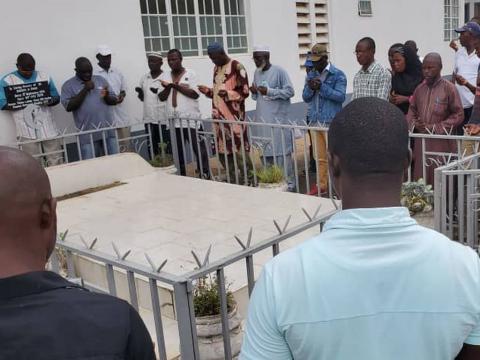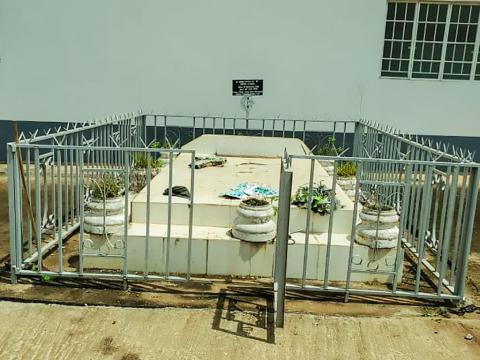By Hajaratu Kalokoh
Five years on Mnday since the death of Dr Shek Umar Khan, the man who headed Sierra Leone’s initial response to the 2014-2016 Ebola Outbreak, the state has still not taken over the responsibilities of his two children.
Speaking to Politico, Dr Khan’s brother C-ray Khan, said the now 24-year-old daughter and the 17-year-old son were being looked after by their uncles and aunts.
He said there had been promises by state officials following his brother’s demise that the children’s upkeep and education would be a matter for the state “because of the invaluable role” Dr Khan had played for the country.
C-ray Khan said nothing like that ever happened, and that he and his siblings had had to look after their nephew and niece.
“We are not complaining”, he said.
Another sibling who doesn’t want to be named said: “We had hoped that a man who fought so selflessly for his country and paid the ultimate price in the process would have his children being looked after by the state”.
The comments by the family of the late virologist come on the fifth anniversary of his death. Ebola survivors, under the auspices of the rights group the Center for Accountability and Rule of Law (CARL) used the occasion on Monday July 29 to shine light on their plight.
The challenge is not just with the Khan family. Survivors of the deadly scourge have also been largely abandoned or at the very least not properly cared for.
Yusuf Kabba, president of the Sierra Leone Ebola Survivors Association (SLAES) lamented that survivors are going through medical challenges from joint pain, eye sight defects, infertility, as well as abnormal menstrual problem.
Kabba said they have been engaging the relevant authorities to settle the problem.
“We engage with service providers and institutions responsible, especially the two line ministries: MOH [Ministry of Health] and MOSWGCA [Ministry of Social Welfare, Gender and Children Affairs] and urge their commitment in addressing these challenges,” he said, adding: “Since then no one has taken a strong stance as to how to respond to those emergency needs.”
Kabba was speaking during a press conference organized to mark the anniversary of the death of Dr Khan. He said the solution to their problem should be a comprehensive one, which will include free social services.
“We want the government to provide quality specialized health care; we want government to allocate a trust fund that will facilitate capacity building, scholarship opportunities and support for orphans embedded in the trust fund and that will be as sustainable support for Ebola survivors,” he said.
CARL is an independent organization that seeks to promote an effective society for Sierra Leone through monitoring institutions of accountability, transparency and the development of citizens.
The rights watchdog is behind a lawsuit currently in front of the Abuja-based ECOWAS court against the government of Sierra Leone regarding how they handled funds for the response against the Ebola virus epidemic in the country.
Ibrahim Tommy, Executive Director of CARL, explained one of the reasons why they took their case to ECOWAS level.
“Collectively the audit shows that the government of Sierra Leone’s response machinery could not account for a huge amount of money that was set aside to respond to the disease, which is $14million. At the time in that report the Auditor General said mismanagement of funds certainly undermined government’s delivery. In other words that could have led to more infection and loss of more life,” Tommy said.
“As a human right organization, we thought it fit that there is a need to address culture of impunity,” he added.
Over 11, 000 died as a result of the West African Ebola epidemic which affected main Sierra Leone and its neighbors Guinea and Liberia. The disease also spread to other African countries and in Europe and the US.
© 2019 Politico Online










